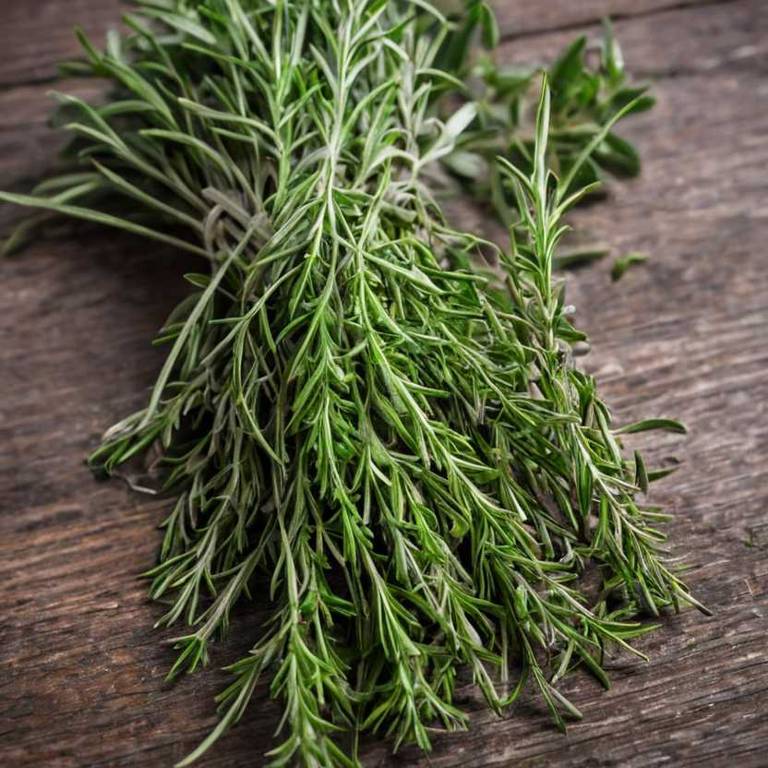10 Best Rosmarinus Officinalis Preparations

The best medicinal preparations of Rosmarinus officinalis are teas, decoctions, tinctures, essential oils, and capsules, each offering unique benefits for health and wellness.
Teas made from fresh or dried leaves are commonly used to improve memory and reduce stress.
Decoctions involve boiling the leaves to extract more robust compounds, often used for digestive support.
Tinctures provide a concentrated form of the herb, ideal for targeted therapeutic use.
Essential oils derived from the plant are valued for their aromatic and therapeutic properties, often used in aromatherapy and topical applications.
Capsules offer a convenient and standardized way to consume the herb’s active compounds for long-term health support.
Below there's a list of the 10 best herbal preparations of rosmarinus officinalis for medicinal purposes.
1. Teas
Rosmarinus officinalis teas is commonly used to support respiratory health, improve mental clarity, and alleviate digestive issues.
The most common medicinal uses include treating coughs, bronchitis, anxiety, and indigestion. This herbal preparation is also used to promote hair growth and reduce inflammation. The bioactive constituents responsible for its medicinal properties include rosmarinic acid, caffeic acid, flavonoids, and essential oils such as camphor and cineole.
These compounds contribute to its antioxidant, anti-inflammatory, and antimicrobial effects.

2. Decoctions
Rosmarinus officinalis decoctions is commonly used to treat respiratory, digestive, and mental health conditions.
These preparations are often employed to alleviate symptoms of colds, coughs, and bronchitis due to their expectorant and anti-inflammatory properties. They are also used to stimulate digestion and relieve indigestion, as well as to improve memory and concentration. The bioactive constituents responsible for these effects include rosmarinic acid, flavonoids, terpenes, and essential oils, which possess antioxidant, anti-inflammatory, and neuroprotective properties.
Additionally, the decoctions may help reduce stress and promote overall well-being.

3. Tinctures
Rosmarinus officinalis tinctures is commonly used to treat respiratory conditions, digestive issues, and mental fatigue due to their stimulating and antispasmodic properties.
These tinctures are often employed to alleviate symptoms of asthma, bronchitis, and indigestion, as well as to enhance memory and concentration. The most common medicinal uses include supporting respiratory health, improving circulation, and reducing stress and anxiety. The bioactive constituents responsible for these effects include essential oils such as camphor, cineole, and pinene, along with antioxidants and polyphenols.
These compounds work synergistically to provide the tinctures with their therapeutic benefits.

5. Capsules
Rosmarinus officinalis capsules is commonly used to support cognitive function, alleviate digestive issues, and reduce inflammation in the body.
These capsules are often prescribed for ailments such as memory loss, indigestion, and muscle pain. The bioactive constituents responsible for these effects include essential oils like rosmarinic acid, camphor, and pinene, as well as polyphenols and flavonoids. These compounds exhibit antioxidant, anti-inflammatory, and neuroprotective properties.
Additionally, they may help in reducing stress and improving mood due to their aromatic and calming effects.

6. Oils
Rosmarinus officinalis oils is commonly used to treat respiratory conditions, muscle pain, and to enhance memory and concentration.
The essential oil is often applied topically for its anti-inflammatory and antiseptic properties, and it is also used in aromatherapy to promote mental clarity and relaxation. Common ailments treated with this preparation include bronchitis, headaches, and skin infections. The bioactive constituents responsible for its medicinal properties include compounds such as rosmarinic acid, camphor, and cineole, which have antioxidant, anti-inflammatory, and antimicrobial effects.
These components contribute to the oil's ability to support respiratory health, reduce inflammation, and improve cognitive function.

7. Creams
Rosmarinus officinalis creams is commonly used to alleviate symptoms of skin conditions, reduce inflammation, and promote wound healing.
These creams are often applied topically to treat ailments such as eczema, psoriasis, and minor cuts or burns. The most common medicinal uses include soothing irritated skin, reducing redness, and providing a cooling effect. The bioactive constituents responsible for these benefits include essential oils like camphor, rosmarinic acid, and flavonoids, which have antioxidant, anti-inflammatory, and antimicrobial properties.
These compounds work together to support skin health and provide therapeutic relief.

8. Syrups
Rosmarinus officinalis syrups is commonly used to treat respiratory conditions, digestive issues, and to enhance mental clarity.
These syrups are often utilized for alleviating symptoms of colds, coughs, bronchitis, and asthma due to their expectorant and anti-inflammatory properties. They are also used to aid digestion, relieve indigestion, and promote appetite. The bioactive constituents responsible for these medicinal effects include rosmarinic acid, flavonoids, terpenes, and essential oils, which possess antioxidant, anti-inflammatory, and antimicrobial properties.
Additionally, the aromatic compounds in rosemary syrups may help reduce stress and improve cognitive function.

9. Lozenges
Rosmarinus officinalis lozenges is commonly used to alleviate symptoms of respiratory tract infections, sore throat, and cough.
These lozenges are often employed to treat conditions such as bronchitis, laryngitis, and common cold due to their anti-inflammatory and antimicrobial properties. The bioactive constituents responsible for these effects include essential oils like camphor, pinene, and limonene, as well as flavonoids and phenolic compounds. These compounds contribute to the herb's ability to reduce inflammation, fight pathogens, and soothe irritated mucous membranes.
Additionally, rosmarinic acid, a key polyphenol, is believed to enhance the immune response and provide antioxidant benefits.

10. Oinments
Rosmarinus officinalis oinments is commonly used to treat various skin conditions, muscle pain, and inflammatory disorders.
These ointments are often applied topically to alleviate symptoms of arthritis, rheumatism, and muscle strains due to their anti-inflammatory and analgesic properties. The most common medicinal uses include reducing joint inflammation, soothing skin irritations, and promoting wound healing. The bioactive constituents responsible for these effects include essential oils like rosmarinic acid, camphor, and flavonoids, which possess antioxidant, anti-inflammatory, and antimicrobial activities.
These compounds work synergistically to provide the therapeutic benefits associated with rosemary ointments.
